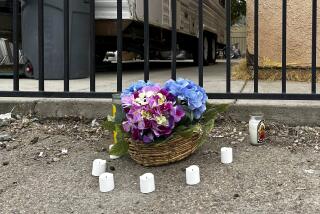Prosecution of Disabled Bomb Plot Suspect Questioned
- Share via
The story sounds familiar: Two teenagers are accused of plotting fatal revenge against classmates who teased them. Authorities say it could have become another in the series of schoolyard killings by outcast students.
But the case of two 18-year-olds jailed on charges of conspiring to detonate a bomb at Burbank High School comes with a twist: One suffers from cerebral palsy. That has some advocates for the disabled questioning his prosecution. It also figures to play a major role in his courtroom defense.
Patrick Longmire of Burbank has a mild form of cerebral palsy that causes him to limp and has kept him in special education classes all his life, his attorney and relatives say. They also contend that he lacks the mental ability to plan and execute an attack on his school.
Police say Longmire nevertheless planned to blow up a math classroom because students constantly taunted him over his disability. He and Christopher Mannino, 18, of Van Nuys were arrested April 21 and remain in jail on $1-million bail each.
Burbank Police Det. Carl Costanzo said Friday the suspects carried out enough of a detailed plan to justify their arrest, regardless of any disabilities.
“When it all comes out, you’ll see how serious this is,” he said.
But Peter Leone, director of the National Center on Education, Disability and Juvenile Justice, said criminal court often is the wrong place to deal with the disabled.
“This comes down to a policy question,” he said. “As a nation, does it make sense for us to lock up a sizable portion of the least competent among us? If so, we need to have our eyes wide open and say this is how we do business in America.”
The D.A.’s office has based its case on conversations taped in April by a 15-year-old Sun Valley girl whose father reportedly was concerned about her relationship with the boys. Police said Mannino also asked a Van Nuys neighbor, Bobby McMullens, to make a bomb.
McMullens, now 19, had detonated a homemade bomb at Birmingham High School in Van Nuys in 1997 while a student there. There were no injuries, and it was one of a number of devices he made, he said.
McMullens, just off probation for that incident, said he is out of the bomb business and turned down Mannino.
Dawn searches at the homes of Longmire, Mannino and McMullens turned up only a battery with a wire attached to it in McMullens’ bedroom, police said. McMullens said he uses it in his new hobby: creating electronic gadgets.
Longmire and Mannino are charged with conspiracy to injure people and attempted possession of a destructive device. If convicted, they could face seven years in prison. A pretrial hearing is scheduled for Thursday in Burbank Superior Court.
Little is publicly known about Mannino, who was not a student at Burbank High. His attorney and relatives declined to comment.
Longmire’s attorney, Charles Lindner, said he will make his client’s disability the centerpiece of his defense at trial.
“Because of his disability, the police can’t establish that this was a serious threat,” he said.
“To conspire to plant or attempt to plant a bomb, he’d have to want to do it, as opposed to just saying, ‘Oh, I think I’ll blow up a federal building,’ ” Lindner said. “Patrick strikes me as extremely gullible and unsophisticated, not someone who’d really want to blow up a school.”
But schools throughout California, including Burbank High, have adopted zero-tolerance policies for students who threaten violence.
Because of that policy, Leone said, school officials and the police are sometimes too quick to punish students, especially those with learning disabilities, for idle threats.
“Under the guise of zero tolerance, a lot of very foolish decisions are made by administrators that should know better,” said Leone, a professor of special education at the University of Maryland. “The juvenile and criminal justice systems are full of people with disabling conditions with so-called bad behavior defined by their poor social skills and poor judgment.”
He compared the Burbank case to that of 18-year-old Michael Gayles in Detroit last fall. Gayles, who had the IQ of an 8-year-old, confessed to the murder and rape of a young girl after a long interrogation. He later recanted and was cleared by DNA evidence. Gayles’ attorney has filed a $20-million lawsuit against the Detroit police.
Diane Lipton, an attorney with the Disability Rights and Defense Fund in Berkeley, said authorities should offer counseling to learning-disabled students rather than jail them if they are not a clear threat.
More to Read
Sign up for Essential California
The most important California stories and recommendations in your inbox every morning.
You may occasionally receive promotional content from the Los Angeles Times.










